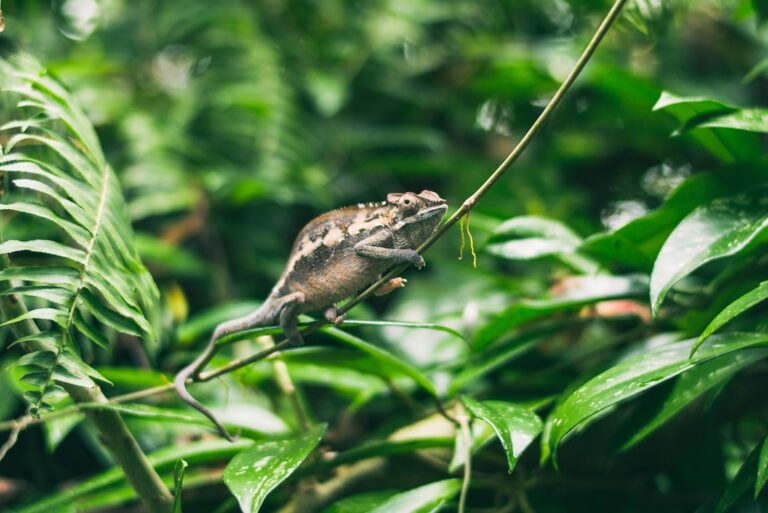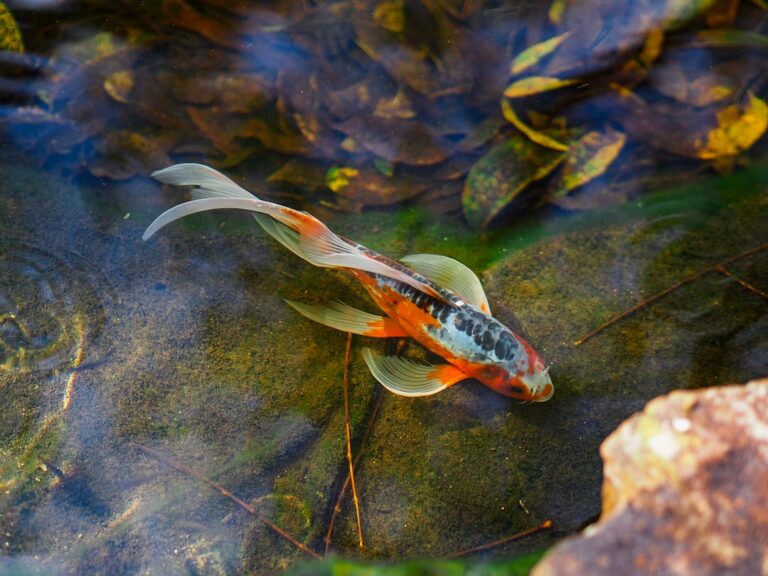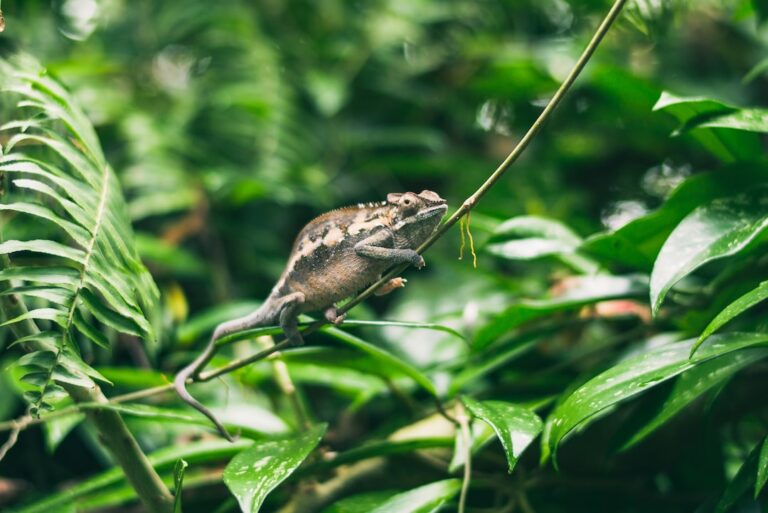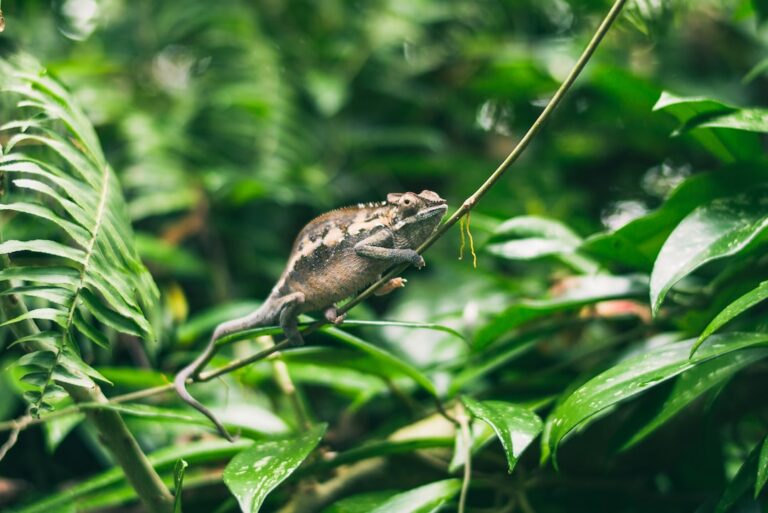Can Chameleons Eat Wasps?
Chameleons are fascinating creatures known for their ability to change color and blend into their surroundings. They are reptiles that belong to the family Chamaeleonidae and are native to Africa, Madagascar, and parts of southern Europe and Asia. Chameleons have unique dietary needs that must be met in order for them to thrive in captivity.
In the wild, chameleons primarily feed on insects such as crickets, grasshoppers, and flies. They have a long, sticky tongue that they use to catch their prey. Chameleons are also known to eat small birds and reptiles on occasion. In captivity, it is important to replicate their natural diet as closely as possible to ensure they receive the necessary nutrients.
Table of Contents
Understanding the Wasp’s Anatomy and Nutritional Value
Wasps are flying insects that belong to the order Hymenoptera. They are known for their stingers and can be found in various habitats around the world. Wasps have a slender body with a narrow waist and two pairs of wings. They are carnivorous insects that primarily feed on other insects, nectar, and fruit.
In terms of nutritional value, wasps are rich in protein and contain essential amino acids that are important for the growth and development of animals. They also provide vitamins and minerals such as vitamin B12, calcium, and iron. However, it is important to note that wasps can also contain toxins depending on the species, which can be harmful if ingested by certain animals.
Can Chameleons Safely Consume Wasps?
While chameleons are insectivores and can consume a variety of insects, including wasps, it is important to exercise caution when feeding them these insects. Some species of wasps have venomous stingers that can cause harm to chameleons if they are stung. Additionally, certain species of wasps may contain toxins that can be harmful if ingested by chameleons.
It is recommended to avoid feeding chameleons wasps unless you are certain that the species of wasp is safe for consumption. If you are unsure, it is best to err on the side of caution and choose alternative foods for your chameleon’s diet.
Potential Risks and Dangers of Feeding Chameleons Wasps
Feeding chameleons wasps can pose several risks and dangers. As mentioned earlier, some species of wasps have venomous stingers that can cause harm to chameleons if they are stung. The venom can cause pain, swelling, and even allergic reactions in some cases.
In addition to the risk of being stung, certain species of wasps may contain toxins that can be harmful if ingested by chameleons. These toxins can cause digestive issues, organ damage, and even death in severe cases.
It is important to thoroughly research the species of wasp before feeding it to your chameleon and consult with a veterinarian or reptile expert if you have any doubts or concerns.
Alternatives to Wasps for Chameleon Diets
If you are looking for alternative foods to feed your chameleon, there are several options that can provide the necessary nutrients without the potential risks associated with feeding them wasps.
Crickets are a popular choice for chameleon diets as they are readily available and provide a good source of protein. Other insects such as grasshoppers, mealworms, and flies can also be included in their diet. It is important to ensure that the insects are gut-loaded, meaning they have been fed a nutritious diet before being fed to your chameleon.
In addition to insects, chameleons can also benefit from consuming fruits and vegetables. Some suitable options include leafy greens, carrots, squash, and berries. These can be offered as occasional treats or as a supplement to their insect diet.
Examining the Natural Diet of Wild Chameleons
To better understand the dietary needs of chameleons, it is important to examine what they eat in the wild. In their natural habitat, chameleons primarily feed on insects such as crickets, grasshoppers, and flies. They also consume small birds and reptiles on occasion.
The diet of wild chameleons is rich in protein and essential nutrients that are necessary for their growth and development. They also benefit from the vitamins and minerals found in the insects they consume.
By replicating their natural diet as closely as possible in captivity, you can ensure that your chameleon receives the necessary nutrients for optimal health.
Factors to Consider Before Feeding Chameleons Wasps
Before deciding to feed your chameleon wasps, there are several factors that should be taken into consideration.
Firstly, it is important to research the specific species of wasp to determine if it is safe for consumption by chameleons. Some species may have venomous stingers or contain toxins that can be harmful if ingested.
Secondly, you should consider the size and age of your chameleon. Younger chameleons may have difficulty consuming larger insects such as wasps and may be at a higher risk of being stung.
Lastly, it is important to observe your chameleon’s behavior and health after feeding them wasps. If you notice any signs of distress or illness, it is best to discontinue feeding them wasps and consult with a veterinarian.
Tips for Feeding Chameleons a Balanced and Nutritious Diet
To ensure that your chameleon receives a balanced and nutritious diet, there are several tips that can be followed.
Firstly, it is important to provide a variety of insects in their diet. This will ensure that they receive a wide range of nutrients. Gut-loading the insects before feeding them to your chameleon is also important to ensure that they are receiving the necessary vitamins and minerals.
Secondly, it is important to offer a variety of fruits and vegetables as occasional treats or supplements to their insect diet. This will provide additional vitamins and minerals that may be lacking in their primary food source.
Lastly, it is important to monitor your chameleon’s weight and overall health. If you notice any changes in their appetite, behavior, or appearance, it may be an indication that their diet needs adjustment.
Common Misconceptions About Chameleon Diets and Wasps
There are several common misconceptions about chameleon diets and the feeding of wasps.
One misconception is that chameleons require a diet consisting solely of insects. While insects are an important part of their diet, chameleons can also benefit from consuming fruits and vegetables as occasional treats or supplements.
Another misconception is that all species of wasps are safe for consumption by chameleons. As mentioned earlier, some species of wasps have venomous stingers or contain toxins that can be harmful if ingested. It is important to research the specific species of wasp before feeding it to your chameleon.
Making Informed Decisions About Chameleon Diets and Wasps
In conclusion, chameleons have unique dietary needs that must be met in order for them to thrive in captivity. While wasps can provide nutritional value, there are potential risks and dangers associated with feeding them to chameleons.
It is important to thoroughly research the specific species of wasp before feeding it to your chameleon and consult with a veterinarian or reptile expert if you have any doubts or concerns.
By providing a balanced and nutritious diet that closely replicates their natural diet in the wild, you can ensure that your chameleon receives the necessary nutrients for optimal health and well-being.
If you’re curious about the eating habits of chameleons, you might also be interested in learning about their ability to survive in cold weather. Check out this fascinating article on reptilefriend.com to discover how chameleons adapt to colder climates and what precautions you should take if you live in a chilly environment.







